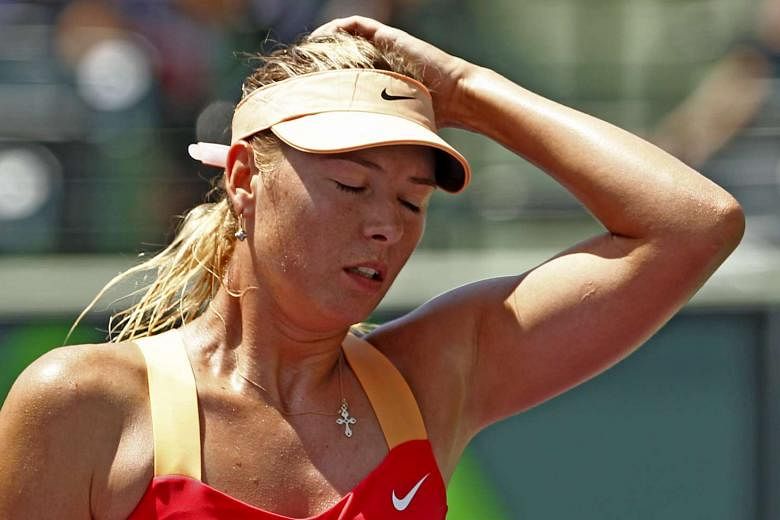LOS ANGELES (REUTERS/AFP) - Maria Sharapova is the most prominent tennis player to test positive for a banned substance in recent years.
The 28-year-old Russian, a five-time Grand Slam champion, will be provisionally suspended starting March 12, the International Tennis Federation (ITF) said.
The ITF's anti-doping programme calls for a four-year suspension for a positive test, but that ban can be reduced in various circumstances, such as for first-time offences or if the player shows no significant fault or negligence. If a player bears no fault or negligence, there is no suspension.
It confirmed in a statement that Sharapova had tested positive on Jan 26 and had accepted the finding when she was notified on March 2.
While her attorney, John Haggerty, agreed the positive test could carry a ban of up to four years, he also expressed hope that mitigating circumstances could see a lesser penalty.
Shamil Tarpishchev, head of the Russian tennis federation, promptly said he believed Sharapova would still have a chance to play at the Rio Olympics in August.
Croatia's Marin Cilic was banned for nine months in 2013 after testing positive for a prohibited stimulant, though the suspension was cut to four months on appeal.
Former world No. 1 Martina Hingis retired after receiving a two-year suspension for a positive cocaine test in 2007, though the Swiss denied taking the drug.
Last year, the sport banned US player Wayne Odesnik for 15 years after his second doping violation, testing positive for steroids and other banned substances.
Sharapova is the biggest name in sport to test positive since New York Yankees baseball slugger Alex Rodriguez was banned for a year in 2013 after using performance-enhancing drugs and American cyclist Lance Armstrong was banned for life from racing in 2012 after a US Anti-Doping Agency investigation.
Sharapova tested positive for meldonium, which is used to treat chest pain and heart attacks among other conditions, but some researchers have linked it to increased athletic performance and endurance. It is listed by the World Anti-Doping Agency (Wada) among its prohibited metabolic modulators, along with insulin, and some researchers say it can also help recovery. It is not approved in the United States but is available in Russia, Latvia and other countries in that region. It was only banned by the World Anti-Doping Agency as of Jan 1.
Over the past month, Russian cyclist Eduard Vorganov, Russian figure skater Ekaterina Bobrova, Ethiopia-born athletes Endeshaw Negesse and Abeba Aregawi, and Ukraine biathletes Olga Abramova and Artem Tyshchenko have all tested positive for meldonium.
Steve Simon, CEO of the Women's Tennis Association, said in a statement he was saddened to hear the news.
"Maria (Sharapova) is a leader and I have always known her to be a woman of great integrity," he said. "Nevertheless, as Maria acknowledged, it is every player's responsibility to know what they put in their body and to know if it is permissible. The WTA will support the decisions reached through this process."

